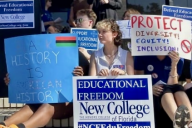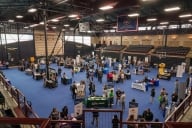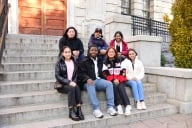You have /5 articles left.
Sign up for a free account or log in.
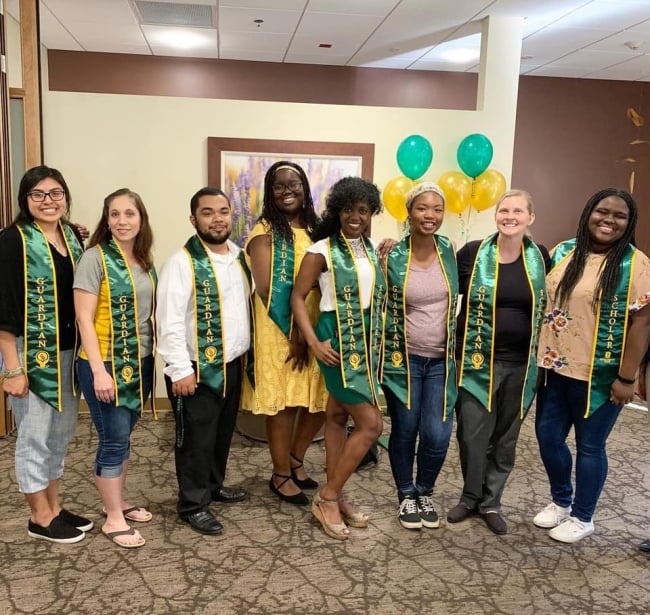
The Sacramento State Guardian Scholars Class of 2019 celebrates graduation.
UCLA Center for the Transformation of Schools
Cody Van Felden bounced in and out of California foster homes until she was adopted at age 4. But life in her adoptive home “wasn’t the greatest environment,” and she experienced emotional abuse.
At age 16, just as her peers began taking college entrance exams and submitting applications to universities, state social services officials deemed Van Felden’s home unsafe, and she abruptly re-entered the foster care system. She graduated high school just over a year later, and when she turned 18 she aged out of the foster care system and was on her own.
“No one had the conversation about college with me,” she said. “I didn’t know any information; I wasn’t doing any of the process.”
Van Felden had to decide whether to go to work or go to college. She chose college and spent the next three years “couch hopping” at friends’ apartments, living in homeless shelters or on the streets of Sacramento while attending a local community college.
Today, at age 25, Van Felden has three associate degrees and is set to graduate from Sacramento State University with a bachelor’s degree in psychology next spring. She credits a program designed for former foster youth like her at Cosumnes River College, a community college in Sacramento, for helping her earn her degrees and placing her on her current academic path.
But not all young people with experience in foster care systems find such support. National estimates show that only 3 percent of them graduate with a bachelor’s degree by age 26, compared to nearly 40 percent of the general population aged 25 and older.
According to a recent report by the UCLA Center for the Transformation of Schools, holistic wraparound services that provide financial and emotional support, consistent and sufficient counseling, and social programming are key to helping students formerly in foster care succeed.
Van Felden said the program she participated in did exactly that. When she was admitted to Cosumnes River College, she was connected with the Guardian Scholars Program, a student support group designed for former foster youth.
“I probably wouldn’t have made it as far as I did without GSP,” she said. “I know for me, personally, it’s created a sense of family.”

Cody Van Felden
The UCLA report surveyed 23 staff members from 19 of the campus-based support programs in the California State University system. The first such program originated at Fullerton College in 1998 and expanded to 22 of the system’s 23 campuses. It is considered a national model among some people who work on foster care issues.
Still, the UCLA report cited ongoing challenges and a need for increased support to help students succeed not only in terms of retention and graduation, but in life beyond college.
Individualized Challenges
Students with a history of foster care often experience accrued trauma and instability and lack the financial, social and emotional support normally provided by family. Although they experience many of the same obstacles as first-generation, minoritized or low-income students, former foster youth often have challenges that differentiate their college experience.
These obstacles are sometimes referred to as invisible barriers, but Kenyon Lee Whitman, lead author of the report, believes they are in plain sight.
“They leave a system that has not invested in them or prepared them for life after graduation,” said Whitman, an assistant professor at the University of Nevada at Las Vegas and a former postdoctoral fellow at UCLA.
Whitman speaks from firsthand experience—he spent 12 years in foster care and went on to serve as director of the Office of Foster Youth Support Services at the University of California, Riverside, while working on his Ph.D.
Students who were not in foster care also may not have parents or other family members who can help pay tuition, but those relatives can provide other forms of indirect support and a home to come to during breaks, which the report refers to as “family privileges.”
“I’m not so sure that’s invisible, because it’s the very function of foster care to take you away from your parents,” Whitman said.
Students exiting the foster care system qualify for federal financial aid, including ETV grants specifically designated for foster youth, and private scholarships. But those financial supports regularly fail to address the family privilege gaps. The aid is also capped at a level that may not fully meet the students’ needs.
Out of 23 college support staff surveyed in the UCLA report, 21 said helping students navigate funding was somewhat or very challenging.
“Students are left in the position of having actual, real costs that they need to pay. And in some cases, even financial aid … could be made available to them to cover those costs. But they literally are not allowed to accept that financial aid,” said Debbie Raucher, director of education at John Burton Advocates for Youth, a California-based nonprofit that partnered with UCLA to produce the report.
The financial barriers created by the federal aid rules force foster youth to develop a greater degree of self-reliance at a much faster pace than peers with family support.
“Everything … everything is falling on their shoulders to have responsibility for,” Raucher said.
Responsive Wraparound Services
The report also reflected overwhelming staff opinions that college administrators must respond to the myriad needs of these students by tailoring programs to provide holistic services and hiring experienced staff members who understand the complex challenges former foster care students face.
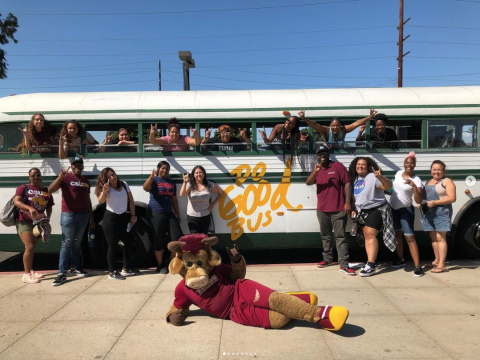
UCLA Center for Transformation of Schools
One hundred percent of program staff surveyed said that in addition to financial and academic assistance, teaching the students how to build healthy relationships and exposing them to social and cultural experiences are also important.
Van Felden, the Cosumnes River College student, said the social support she got from the Guardian Scholars Program was key to helping her succeed in college.
“It provided a sort of comfort,” she said. “It’s stationary. It doesn’t move. So there’s no chance of it abandoning me like other people had in the past.”
About 85 percent of personnel surveyed viewed program case management staff as very important, according to the report. But these staff members are often overworked and have responsibilities that stretch across multiple roles. And if they leave their jobs, it can sometimes undermine the stability of the programs and the relationships they built with the students.
“Just like any field, we have turnover,” said Rachel Strawn, director of the Virginia community college program for students who were in foster care, Great Expectations. “That’s challenging, because, if you’ve built up relationships in the community and on campus with students and also with local Department of Social Services workers, then the coach goes on to another role … then the new coach kind of has to start all over.”
Lori Tiller, co-director of Embark, the foster support network for Georgia’s public colleges and universities, said designating foster-focused staff, decreasing turnover and institutionalizing programs is one of her goals.
That way, “when that amazingly supportive person that’s running the program leaves for wonderful opportunities, it will continue without them,” she said.
Need for Support
Building staff and expanding campus programs and state networks requires the support of university leaders and state lawmakers, however.
The report noted survey responses by staff members who said their colleges’ leaders were not always supportive and at times stigmatized or ignored foster-support programs entirely. Respondents cited “lack of support and understanding,” “red tape” and leaders who viewed foster youth as “just a ‘hard-luck’ case.”
“It feels a bit sad, because we know that when staff members in higher ed have support and feel supported from the leadership, they’re able to do a better job of supporting their students, therefore their students do better on campus,” Whitman said. “There is an entire ecosystem … and then everyone wins.”
But the advocacy by those who work with and on behalf of this population of students hasn’t gone entirely without notice. It’s led to growing awareness by lawmakers in several states where legislatures have approved funding to create or expand programs for youths transitioning out of the foster care system.
Maggie Stevens, CEO of the Indiana-based nonprofit Foster Success, said her state legislators have paid attention, listened to and prioritized support for the foster care community.
“I think the No. 1 thing that we all need to do is to continue to raise awareness about this population in general,” Stevens said. “Making sure that our university leaders, that our legislators know that these young people are in our communities, they’re on our campus, and they are the individuals who will be in our workforce.”
